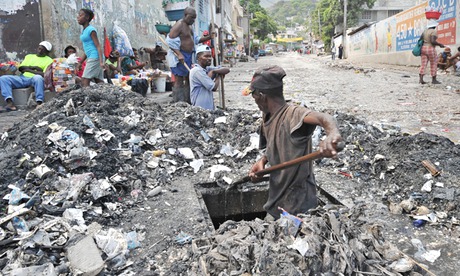
Take a walk through the streets of Port-au-Prince, the Haitian capital, and you will be struck by the huge proliferation of litter and waste, from plastic bottles and bags to polystyrene wrappings. Parks and paths are scattered with them; they block the drains and festoon the harbour.
In 2012, the Haitian government passed a law forbidding the import of polyethylene and polystyrene in a bid to counter the menace. Quite obviously, it hasn’t been enforced or monitored properly.
As a Haitian, I have always been very proud of the country’s rich natural beauty. But I fear the amount of waste and its ineffective management are becoming a national disgrace.
The sight and smell of littered streets and drains in parts of Port-au-Prince will inevitably affect the burgeoning tourist trade. Nobody wants to be picking over rubbish as soon as they arrive at their holiday hotel.
It also impacts the daily lives of citizens. When the earthquake hit Haiti in 2010, fragile sewage systems in Port-au-Prince and other towns and cities were almost entirely destroyed, causing waste to run through street gutters in many of the poorest areas. During heavy rains and tropical storms, the gutters became congested by plastic drink bottles and bags, causing overflows into homes and shops, ruining business, and threatening health.
The reason for the swaths of rubbish contaminating the city appears to be that, despite the ban on plastics, we are importing far more soft drinks in plastic bottles and foods in polythene wrappings than ever before. Soft-drink adverts are ubiquitous – on billboards, along roadsides, and on television – and the demand for such products won’t be falling any time soon.
The health implications of blocked and overflowing sewers are obvious. But the vast majority of solid waste – including plastics, polystyrene, polythene and other non-biodegradable materials – is either not collected at all or simply thrown into open municipal dumps and shallow landfills. The long-term health, economic and environmental impacts for Haiti could be catastrophic.
Rotting solid waste in large quantities is a significant source of methane gas. If inhaled, it is particularly harmful in the short-term and can cause slurred speech, nausea, vomiting, diarrhoea, and headaches. In severe cases, it can cause respiratory and heart complications.
Moreover, methane is a greenhouse gas. Its comparative impact on climate change is more than 20 times greater than CO2 over a 100-year period, according to the US Environmental Protection Agency.
I was astonished to read the World Bank’s What a Waste study, published in June 2012, which estimates that cities generate about 1.3bn tons of solid waste a year. This is expected to increase by 69%, to 2.2bn tons, over the next decade; managing it will cost about $375.5bn.
Most worryingly, the report also predicts that waste-generation rates will more than double over the next 20 years in lower-income countries such as Haiti. This is partly because the number of people migrating to urban centres such as Port-au-Prince has been steadily rising for the past 30 years, increasing the amount of rubbish created and making it vital that we come up with a comprehensive national management plan – fast.
A positive step in the right direction is waste recycling. In exchange for cash from private and government-run companies, internally displaced people living in post-earthquake camps collect 300-600lbs of plastics a week. About 80% of this secondary raw material is then exported to Asian countries for industrial purposes, or to recycle for use as packaging.
One informally employed waste-picker, Ramón, told me that he receives four Haitian gourdes for every pound of plastic collected, so long as he removes the paper stickers glued to the bottles. This works out at about $52 (£31) a week – not a terrible income, given that many of the poorest families in Haiti live on less than $1 a day, but not enough to support most families either.
There are more than 2 million informal waste-pickers around the world. Waste recycling is now a legitimate global business, with robust international markets and extensive supply and transportation networks.
A Université Paris-Dauphine study has shown that the field of waste recovery in Haiti has developed significantly over the past few years, thanks to the emergence of an international market for secondary raw materials, especially in China. This sector could offer significant economic opportunities for our earthquake recovery activities, as well as creating more jobs and allowing a significant input of currency across the country.
We have the significant competitive advantage of a large, relatively cheap workforce, but I believe if waste-pickers were paid a bit more – and given more formal employment arrangements in proper, government-run centres across the country – far more poor people would be incentivised to work in, and benefit from, the opportunities this growing sector offers. Improperly managed waste usually results in higher costs further down the line, such as environmental clean-ups and the cost of treating chronic health problems.
With this in mind, I strongly urge the Haitian ministry of environment to devise a proper policy to manage Haiti’s waste and recycling industries better. That way, the waste we produce can be used an alternative and cheaper energy source, reduce pressure on the environment, and improve the lives of the most vulnerable.